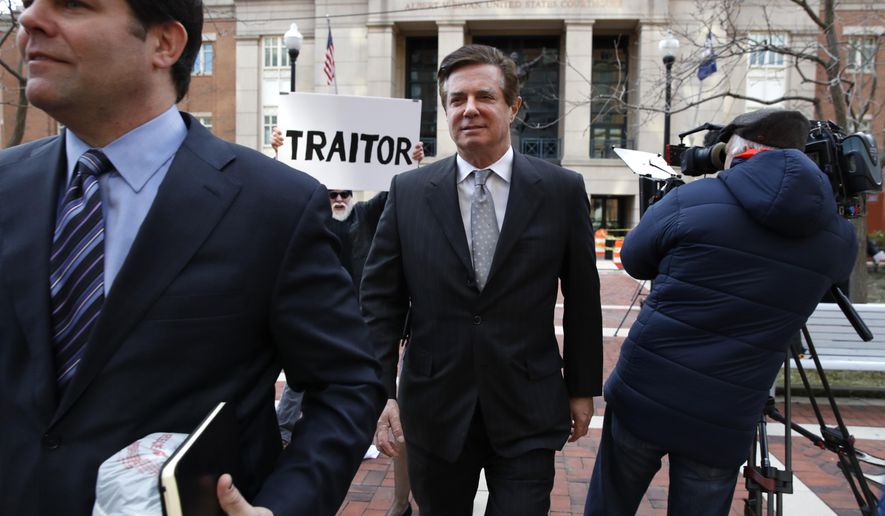Former Trump campaign chairman Paul Manafort argued in court papers filed Wednesday night that special counsel Robert Mueller doesn’t have the right to prosecute him because the allegations predate his work on the 2016 presidential election.
Attorneys for Mr. Manafort filed the papers late Wednesday in the U.S. District Court for the District of Columbia where he is facing five charges, including conspiracy against the United States and making false statements. If convicted, he could face up to 20 years in prison.
The charges against Mr. Manafort stem from lobbying work he did in the Ukraine. Prosecutors allege he tried to hide the income he earned by working with pro-Russian factions of the Ukrainian government through a complicated scheme involving money laundering and off-shore accounts.
But his attorneys claim the special counsel’s investigation is limited to claims the Trump campaign colluded with the Russian government during the election, not activities Mr. Manafort may have engaged in nearly a decade before he began working for Mr. Trump. The consulting work ended in 2014 and have no connection to the Trump campaign or Russia, his attorneys said.
“Those issues simply have no connection to the alleged coordination with the Russian government or the 2016 presidential election,” Mr. Manafort’s lawyer wrote.
Mr. Manafort has made similar claims in a civil suit he filed against Mr. Mueller.
The Justice Department, which is overseeing the Mueller investigation, has argued in previous court filings that the special counsel has the authority to pursue any crime it discovers during the Russian probe. Mr. Manafort’s lawyers on Wednesday compared such authority to the equivalent to giving someone a blank check.
“Far from exercising the limited powers provided by the Special Counsel Regulations, the appointment order gives the Special Counsel prosecutorial authority that is strikingly broad,” Mr. Manafort’s attorneys continued. “He is supposedly granted carte blanche to investigate and prosecute ’any matters’ he may stumble upon during the course of investigating purported coordination between the Trump campaign and the Russian government.”
In a separate motion, also filed Wednesday, Mr. Manafort asked the court to dismiss one of two charges alleging he made false statements in registering his foreign lobbying work. His attorneys said the duplicative charges violate his Fifth Amendment right to protection from double jeopardy.
He also sought dismissal of a conspiracy money laundering charge, arguing that even if he failed to register as a foreign agent in the United States, the money he made from consulting wasn’t illegal.
If those arguments are successful, it could reduce the charges he faces from five to three.
A trial on the D.C., charges is set for September, and the Virginia trial is scheduled for July. If convicted in Virginia, Mr. Manafort could face 305 years in prison.
Mr. Manafort and his longtime business associate Rick Gates, who briefly worked as aide in the Trump campaign, were first indicted in October on charges of conspiracy and making false statements. They both pleaded not guilty.
A second indictment was filed against the pair in February. At first the two pleaded not guilty, but Gates later changed his plea. Gates pleaded guilty to charges of conspiracy against the United States and making false statements and is cooperating with the special counsel’s office.
Mr. Manafort has maintained his innocence, even criticizing Gates for accepting the guilty plea.
“I had hoped and expected my business colleague would have had the strength to continue the battle to prove our innocence.” Mr. Manafort said in a statement released after Gates changed his plea. “For reasons yet to surface he chose to do otherwise. This does not alter my commitment to defend myself against the untrue piled up charges contained in the indictments against me.”
• Jeff Mordock can be reached at jmordock@washingtontimes.com.




Please read our comment policy before commenting.